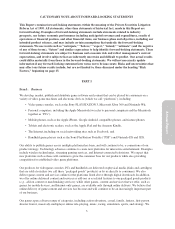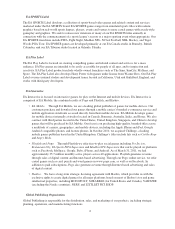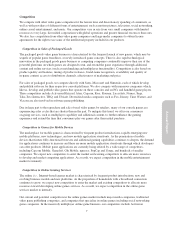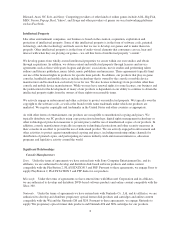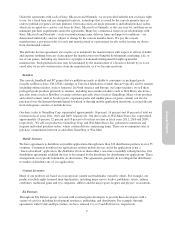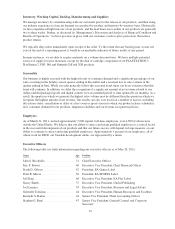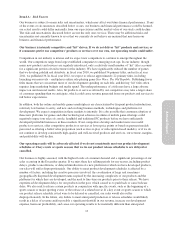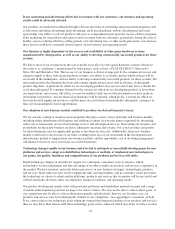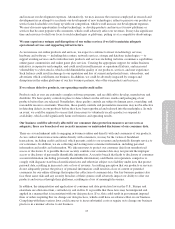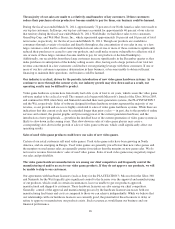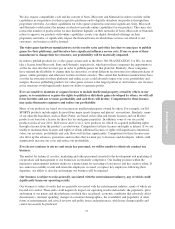Electronic Arts 2011 Annual Report Download - page 84
Download and view the complete annual report
Please find page 84 of the 2011 Electronic Arts annual report below. You can navigate through the pages in the report by either clicking on the pages listed below, or by using the keyword search tool below to find specific information within the annual report.Blizzard, Atari, NC Soft, and Sony. Competing providers of other kinds of online games include AOL, Big Fish,
MSN, Nexon, Popcap, Real, Yahoo!, and Zynga and other providers of games on social networking platforms
such as Facebook.
Intellectual Property
Like other entertainment companies, our business is based on the creation, acquisition, exploitation and
protection of intellectual property. Some of this intellectual property is in the form of software code, patented
technology, and other technology and trade secrets that we use to develop our games and to make them run
properly. Other intellectual property is in the form of audio-visual elements that consumers can see, hear and
interact with when they are playing our games – we call this form of intellectual property “content.”
We develop games from wholly-owned intellectual properties we create within our own studios and obtain
through acquisitions. In addition, we obtain content and intellectual property through licenses and service
agreements such as those with sports leagues and players’ associations, movie studios and performing talent,
authors and literary publishers, music labels, music publishers and musicians. These agreements typically limit
our use of the licensed rights in products for specific time periods. In addition, our products that play on game
consoles, handhelds and mobile devices include technology that is owned by the console or mobile device
manufacturer and licensed non-exclusively to us for use. We also license technology from providers other than
console and mobile device manufacturers. While we may have renewal rights for some licenses, our business and
the justification for the development of many of our products is dependent on our ability to continue to obtain the
intellectual property rights from the owners of these rights on reasonable terms.
We actively engage in enforcement and other activities to protect our intellectual property. We typically own the
copyright to the software code, as well as the brand or title name trademark under which our products are
marketed. We register copyrights and trademarks in the United States and other countries as appropriate.
As with other forms of entertainment, our products are susceptible to unauthorized copying and piracy. We
typically distribute our PC products using copy protection technology, digital rights management technology or
other technological protection measures to prevent piracy and the use of unauthorized copies of our products. In
addition, console manufacturers typically incorporate technological protections and other security measures in
their consoles in an effort to prevent the use of unlicensed product. We are actively engaged in enforcement and
other activities to protect against unauthorized copying and piracy, including monitoring online channels for
distribution of pirated copies, and participating in various industry-wide enforcement initiatives, education
programs and legislative activity around the world.
Significant Relationships
Console Manufacturers
Sony. Under the terms of agreements we have entered into with Sony Computer Entertainment Inc. and its
affiliates, we are authorized to develop and distribute disk-based software products and online content
compatible with the PlayStation 2, PLAYSTATION 3 and PSP. Pursuant to these agreements, we engage Sony to
supply PlayStation 2, PLAYSTATION 3 and PSP disks for our products.
Microsoft. Under the terms of agreements we have entered into with Microsoft Corporation and its affiliates,
we are authorized to develop and distribute DVD-based software products and online content compatible with the
Xbox 360.
Nintendo. Under the terms of agreements we have entered into with Nintendo Co., Ltd. and its affiliates, we are
authorized to develop and distribute proprietary optical format disk products and cartridges and online content
compatible with the Wii and the Nintendo DS and 3DS. Pursuant to these agreements, we engage Nintendo to
supply Wii proprietary optical format disk products and Nintendo DS and 3DS cartridges for our products.
8







